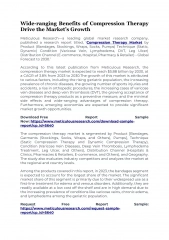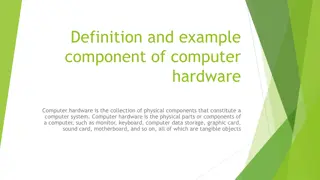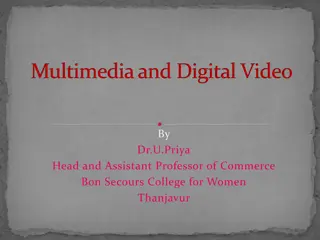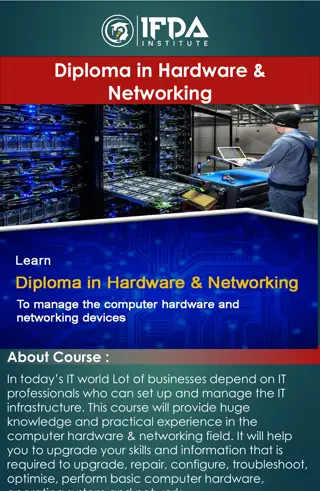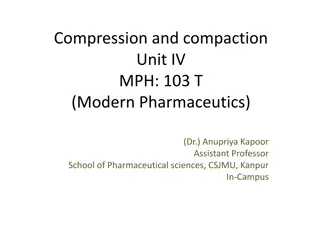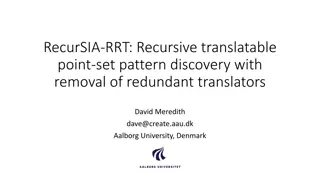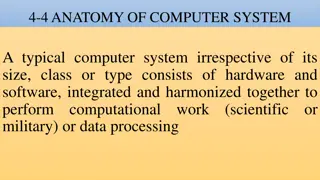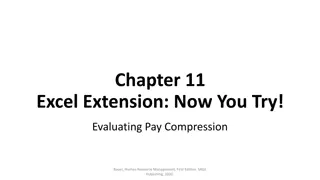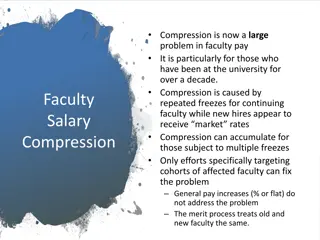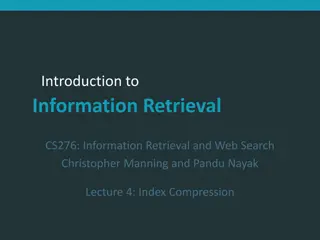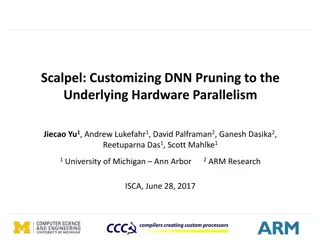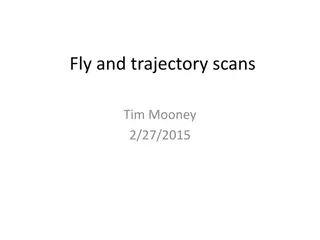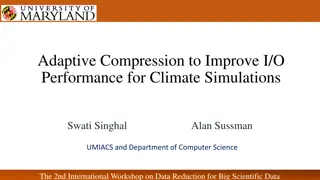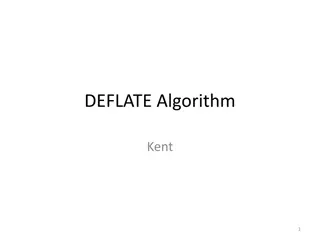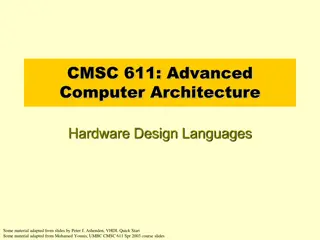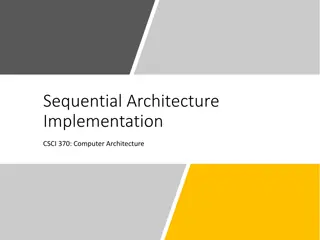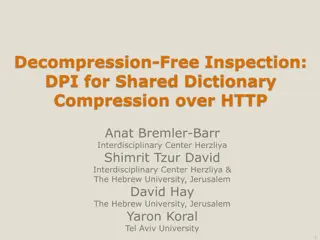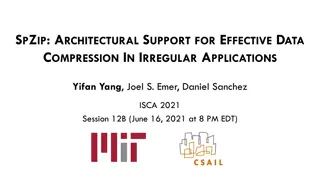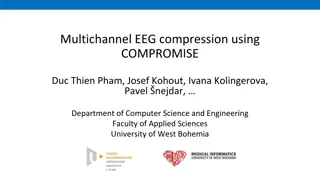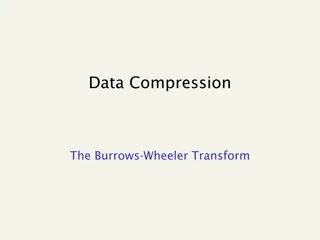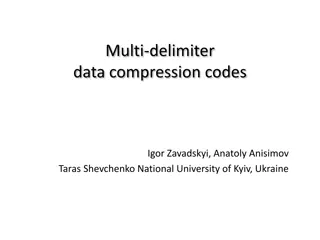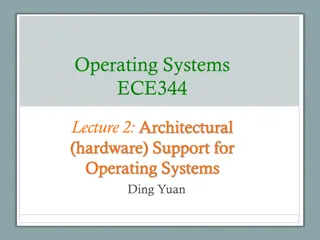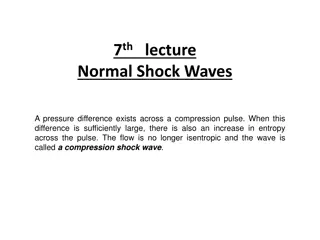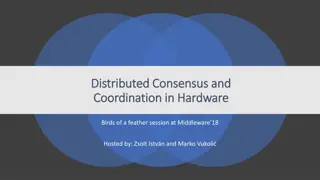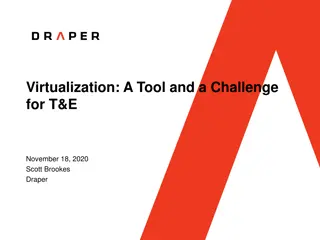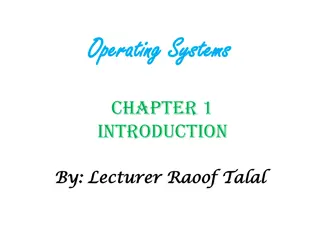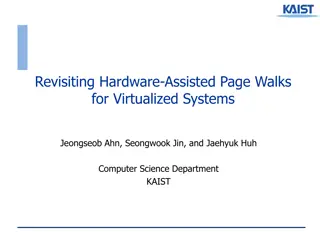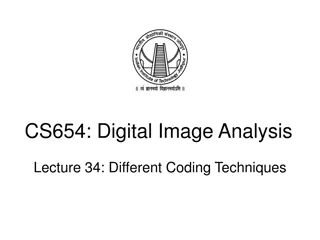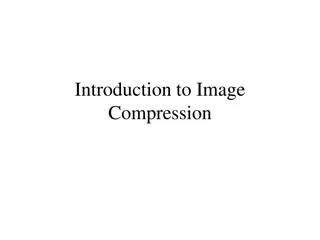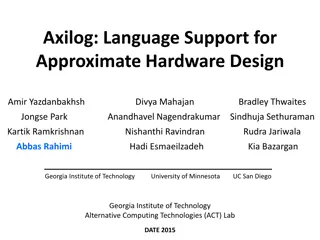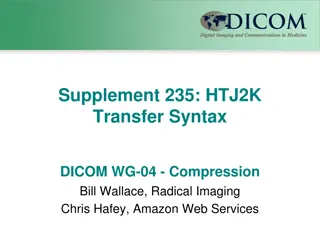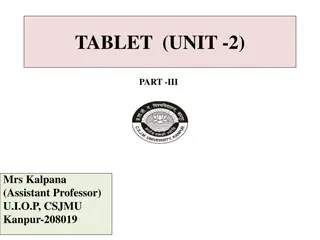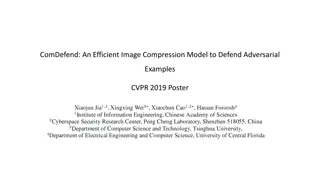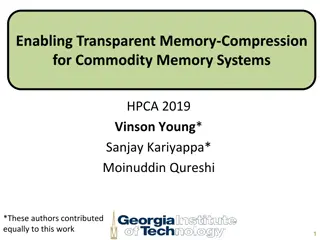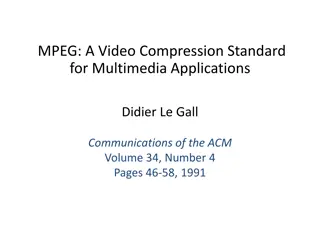Wide-ranging Benefits of Compression Therapy Drive the Market’s Growth
Compression Therapy Market by Product (Bandages, Stockings, Wraps, Socks, Pumps) Technique (Static, Dynamic) Condition (Varicose Vein, Lymphedema, DVT, Leg Ulcer) Distribution Channel (E-commerce, Hospital, Pharmacy & Retailer)
5 views • 2 slides
Understanding Computer Organization and Architecture
A computer system is a programmable digital electronics device that processes data as per program instructions to provide meaningful output. It comprises hardware and software components, with hardware being the physical parts and software essential for driving the hardware. Computer organization fo
14 views • 71 slides
Hold Down and Release Mechanism Hardware Simulator for Ground Deployment Testing
The project involves developing a hardware simulator for testing a Hold Down and Release Mechanism used in Mars Sample Return missions. The simulator aims to replicate the functionality of expensive flight hardware at a lower cost and with reduced lead time. Key requirements include precise activati
3 views • 8 slides
Hot And Cold Compression Therapy | Frozenoasis.com.au
With the hot and cold compression therapy offered by Frozenoasis.com.au, get the maximum amount of relief. Bid farewell to suffering and hello to health. Buy today!\n\n\/\/frozenoasis.com.au\/
3 views • 1 slides
Overview of Computer Hardware Components and Software Functions
Computer hardware components such as monitor, CPU, mouse, and projector are essential physical parts of a computer system, while software includes intangible programs like operating systems and utility software. Hardware components perform tasks like displaying data, processing information, and prin
8 views • 9 slides
Understanding Multimedia and Digital Video Concepts
Explore the world of multimedia and digital video through this informative content. Learn about the meaning of multimedia, stages of transport in multimedia, key concepts, compression methods, data compression in action, and compression techniques. Discover how multimedia combines text, audio, and i
0 views • 51 slides
Diploma in Hardware & Networking: Upgrade Your IT Skills
This course provides comprehensive knowledge and practical experience in computer hardware and networking, essential for managing IT infrastructure. Gain expertise in PC hardware maintenance, customer and networking support, and more to pursue a career as a Hardware and Network Engineer. Learn to as
1 views • 8 slides
Understanding Tablet Compression and Compaction in Modern Pharmaceutics
This educational material delves into the physics of tablet making, focusing on the forces involved, compaction profiles, and effects of friction. Students will gain knowledge about tablet compression, compaction, and consolidation, including the types of forces at play and the distribution of force
0 views • 16 slides
Compression-Driven Point Set Pattern Discovery in Music
Compression-driven point set pattern discovery in music explores the principle of parsimony in data representation. By applying compression-based algorithms, researchers aim to simplify the description of musical data, leading to better performance in tasks such as classification of folk songs, simu
0 views • 12 slides
Anatomy of a Computer System: Hardware Components and Functions
A typical computer system consists of hardware and software working together to perform various computational tasks. The hardware components include the central processing unit (CPU), input/output devices, storage units, and the motherboard. The CPU acts as the main brain of the computer, performing
6 views • 6 slides
Understanding Computer Hardware Components
Computer hardware encompasses the physical components of a computer system that can be touched and felt, such as the motherboard, CPU, RAM, and storage devices like HDD and SSD. Without hardware, essential software cannot run efficiently. This lesson explores the definition, importance, and various
1 views • 6 slides
Excel Tutorial: Evaluating Pay Compression with Compa-Ratios
Learn how to evaluate pay compression using compa-ratios and tenure data in Excel. The tutorial guides you through calculating compa-ratios for customer service representatives, comparing actual pay to the pay range midpoint, and identifying potential pay compression issues.
0 views • 23 slides
Addressing Faculty Salary Compression Issues in Higher Education
Faculty salary compression has become a significant challenge in higher education, particularly affecting long-serving faculty members. This issue arises from repeated freezes on the salaries of existing faculty while new hires receive higher market rates. General pay increases and merit processes d
0 views • 6 slides
Introduction to Information Retrieval: Compression Techniques and Index Optimization
Exploring concepts from information retrieval, this content delves into index compression methods such as blocked sort-based indexing and single-pass in-memory indexing. It discusses the importance of compression for inverted indexes to optimize memory usage and decrease disk space requirements, ult
2 views • 50 slides
Optimizing DNN Pruning for Hardware Efficiency
Customizing deep neural network (DNN) pruning to maximize hardware parallelism can significantly reduce storage and computation costs. Techniques such as weight pruning, node pruning, and utilizing specific hardware types like GPUs are explored to enhance performance. However, drawbacks like increas
0 views • 27 slides
Overview of Fly and Trajectory Scans in Data Acquisition
Fly and trajectory scans in data acquisition involve software and hardware options for acquiring data while positioners move at constant speeds. Software fly scans enable periodic data acquisition triggered by software, while hardware fly scans rely on pulses from positioners. Hardware fly choices a
0 views • 14 slides
Enhancing I/O Performance Through Adaptive Data Compression in Climate Simulations
This research focuses on improving I/O performance for climate simulations by employing adaptive data compression techniques. Scientific data compression methods, such as lossy and lossless compression, are explored to reduce data volume and increase effective I/O bandwidth. The study highlights the
0 views • 18 slides
Understanding Data Storage and Compression Techniques
Explore various concepts related to data storage and compression, including higher revision techniques, watch points for debugging, RAID disk mirroring, media compression methods, mantissa and exponent representation, and the impact of precision/range adjustments in numerical calculations. Learn abo
0 views • 13 slides
Understanding DEFLATE Algorithm: LZ77, Huffman Coding, Compression
DEFLATE algorithm, developed by Kent, combines LZ77 compression with Huffman coding. LZ77 algorithm compresses data using a sliding window technique, while Huffman coding assigns variable-size codewords to characters based on frequency. This process enables efficient data compression and decompressi
0 views • 12 slides
Understanding Hardware Design Languages in Advanced Computer Architecture
This material covers topics like behavioral correctness, timing simulations, domains, and levels of modeling in hardware design languages. It discusses functional and structural modeling, as well as the use of simulators to analyze and verify system behavior. Hardware Design Languages, behavioral de
0 views • 38 slides
Understanding Y86-64 Instruction Set and Hardware Control Language
Delve into the Y86-64 instruction set architecture, exploring sequential architecture implementations for computer architecture. Uncover the various instruction sets and their functionalities, such as halt, nop, call, ret, and more. Additionally, discover the building blocks of hardware, including A
0 views • 51 slides
Dictionary Compression and Deep Packet Inspection (DPI) Overview
This content discusses Decompression-Free Inspection (DPI) for shared dictionary compression over HTTP, the challenges and solutions in deep packet inspection (DPI), compressed HTTP methods, examples of intra-response and inter-response compression, and current operations of Network Intrusion Detect
0 views • 33 slides
Architectural Support for Effective Data Compression in Irregular Applications
Irregular applications, such as graph analytics and sparse linear algebra, are memory-bound workloads. This paper discusses the challenges of compressing data structures in irregular applications, focusing on specialized hardware to accelerate data access and decompression. The study highlights the
0 views • 26 slides
Multichannel EEG Compression Using COMPROMISE Study
A study on multichannel EEG compression using COMPROMISE by Duc Thien Pham, Josef Kohout, Ivana Kolingerova, Pavel Nejdar from the Department of Computer Science and Engineering, Faculty of Applied Sciences, University of West Bohemia. The study covers datasets, methods, and discussions related to E
0 views • 12 slides
Understanding the Burrows-Wheeler Transform and Suffix Array
Explore the concept of the Burrows-Wheeler Transform and Suffix Array, key algorithms in data compression. Learn about the transformation process, suffix arrays, compression techniques like Bzip, and how to compute the BWT. Discover the significant role these methods play in efficient data compressi
0 views • 10 slides
Comprehensive Overview of Multi-delimiter Data Compression Codes and Key Features
This content showcases the concept of multi-delimiter data compression codes, their application in various algorithms such as arithmetic, finite state entropy, Huffman, and Fibonacci. Key features including compression rate, synchronization, search in compressed files, encoding/decoding speed, and c
0 views • 27 slides
Architectural Hardware Support for Operating Systems in ECE344 Lecture
The lecture discusses the importance of hardware support in operating systems, emphasizing the management of hardware resources and providing a clear interface to programs. It explores the fundamental relationship between operating system functionality and hardware, highlighting how hardware support
0 views • 53 slides
Understanding Normal Shock Waves in Gas Dynamics
In gas dynamics, normal shock waves occur when there is a significant pressure difference across a compression pulse, leading to increased entropy. This results in non-isentropic flow known as compression shock waves. The formation of compression and expansion waves can be likened to piston movement
0 views • 16 slides
Distributed Consensus and Coordination in Hardware Birds of a Feather Session
Specialists in distributed consensus and hardware coordination gathered at Middleware 18 for a session hosted by Zsolt István and Marko Vukoli. The session covered topics such as specialized hardware, programmable switches and NICs, P4 language for expressing forwarding rules, and deployment exampl
0 views • 33 slides
Understanding Virtualization: Hardware Abstraction and Hypervisor Concepts
Dive into the world of virtualization with a focus on hardware abstraction and hypervisor technology. Explore the definitions and examples of hardware virtualization, hypervisors, and hardware abstraction, shedding light on how they enable multiple operating systems to coexist on a single physical m
0 views • 21 slides
Understanding Operating Systems: An Introduction and Overview
An operating system is a crucial program that manages computer hardware and serves as an intermediary between users and hardware. This chapter explores the role of operating systems in a computer system, covering components like hardware, application programs, and users. It delves into how operating
0 views • 16 slides
Hardware-Assisted Page Walks for Virtualized Systems
Virtualization in cloud computing and server consolidation relies on hardware-assisted page walks for address translation in virtualized systems. This involves two-level address translations to ensure isolated address spaces for each virtual machine, utilizing multi-level page tables to manage memor
0 views • 32 slides
Lossless Compression Techniques in Digital Image Analysis
Explore various coding techniques used for lossless compression in digital image analysis, including RLE, Huffman coding, arithmetic coding, LZW, and DPCM. Learn about run-length encoding, 2D RLE, and how DPCM encodes changes between consecutive samples to achieve compression while preserving image
0 views • 39 slides
Understanding Image Compression Techniques
Image compression is essential for reducing file sizes without significant loss of quality. This article explores three common techniques: Run-Length Encoding, Arithmetic Encoding, and their applications in data compression. Learn about encoding intervals, probability ranges, and decoding processes
0 views • 33 slides
Approximate Computing in Hardware Design: A Comprehensive Overview
Explore the groundbreaking concepts of approximate computing in hardware design, which involves embracing errors to enhance resource efficiency and performance. Delve into topics such as avoiding worst-case design, criteria for approximate HDL, safety in hardware, and relaxing accuracy requirements
0 views • 31 slides
Revolutionizing Image Compression with HTJ2K Transfer Syntax
Revolutionize image compression with HTJ2K Transfer Syntax, a groundbreaking technology that addresses existing challenges in compression standards like JPEG 2000. HTJ2K offers improved decode and encode speeds, strong open-source support, and scalable resolution access. Explore how HTJ2K is reshapi
0 views • 6 slides
Understanding Tablet Compression Machine Process
The process of tablet compression involves filling, compression, and ejection of granules to create tablets. Different types of tablet machines, such as single punch and multi-station rotary presses, are used in the process. Components like hoppers, dies, punches, cam tracks, and feeding mechanisms
0 views • 8 slides
Efficient Image Compression Model to Defend Adversarial Examples
ComDefend presents an innovative approach in the field of computer vision with its efficient image compression model aimed at defending against adversarial examples. By employing an end-to-end image compression model, ComDefend extracts and downscales features to enhance the robustness of neural net
0 views • 16 slides
Enhancing Memory Bandwidth with Transparent Memory Compression
This research focuses on enabling transparent memory compression for commodity memory systems to address the growing demand for memory bandwidth. By implementing hardware compression without relying on operating system support, the goal is to optimize memory capacity and bandwidth efficiently. The a
0 views • 34 slides
Overview of MPEG: Video Compression Standard
The MPEG video compression standard revolutionized multimedia applications by enabling full-motion video over networks. Introduced in 1988 by the Motion Picture Experts Group, MPEG-1 focused on video compression but also included audio, with notable advancements like MP3. This standard addressed the
0 views • 29 slides
